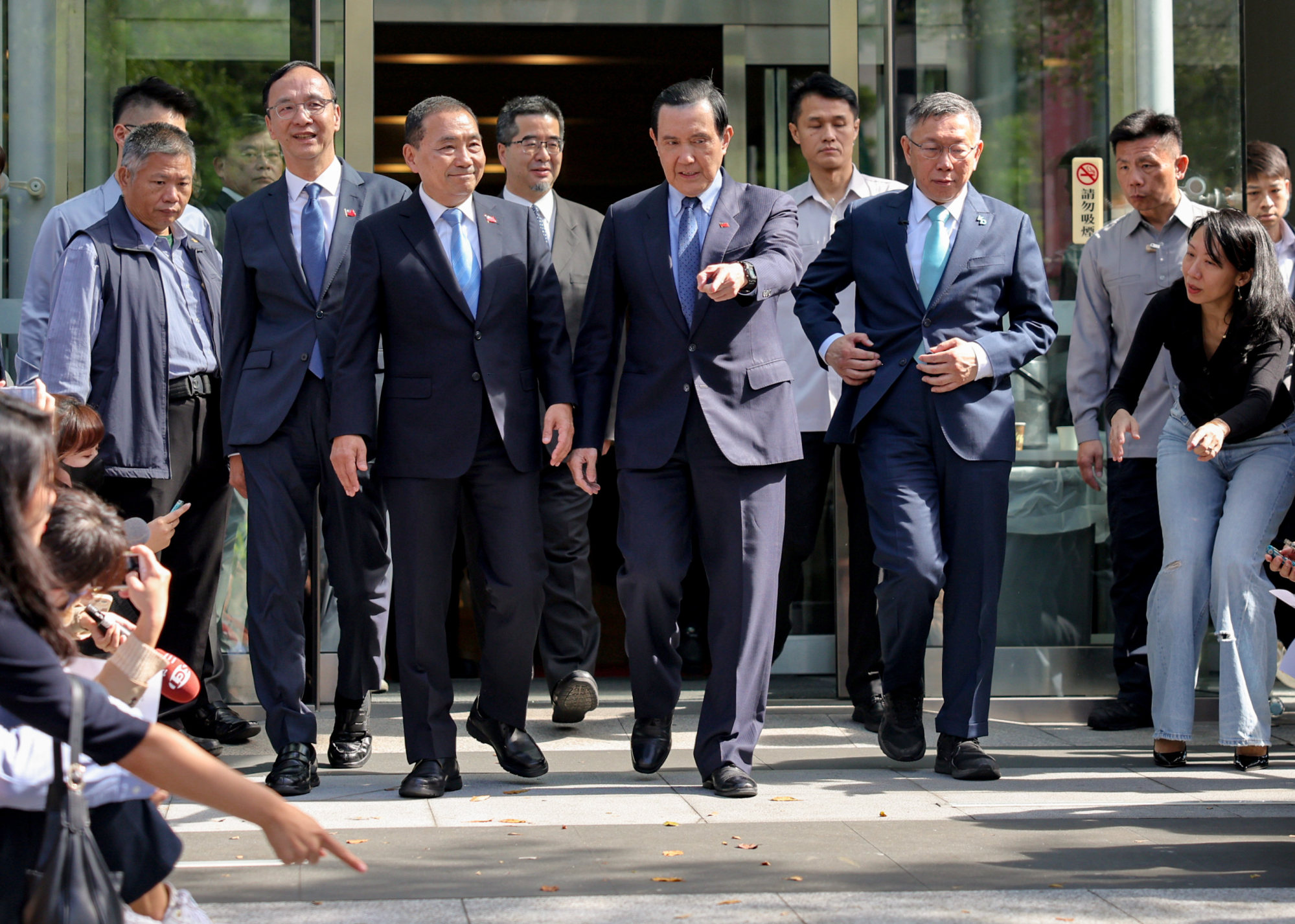
Taiwan’s opposition KMT, TPP agree to joint ticket in presidential race
- Kuomintang and Taiwan People’s Party to announce candidate and running mate on Saturday
- The two mainland-friendly parties say they hope to form a coalition government
The move comes as opinion polling suggests a joint opposition bid will offer the most likely chance to defeat the ruling, independence-leaning Democratic Progressive Party. Vice-President William Lai Ching-te, the DPP candidate, has been front runner in the race since he was nominated in April.

The main opposition Kuomintang and smaller Taiwan People’s Party agreed to join forces in a meeting on Wednesday, with the aim of forming a coalition government next year.
They will announce the presidential candidate and their running mate on Saturday, ahead of registration which begins next week.
Also attending were KMT chairman Eric Chu Li-luan and the two parties’ presidential candidates – TPP chairman Ko Wen-je and the KMT’s Hou Yu-ih, mayor of New Taipei City. They held talks for more than 2½ hours at the Ma Ying-jeou Foundation in Taipei.
Ma, who has touted a joint ticket as the best way to defeat the DPP in the election, said the two sides would work hard to achieve their goal.
The TPP’s Ko said he was looking forward to working towards a coalition government. “This is a historic moment – never before in Taiwan’s history has a coalition government existed,” Ko said, adding that he hoped the attempt would bring benefits to the island in the future.
KMT chairman Chu said the move was in line with mainstream opinion since polling had shown more than 60 per cent of voters would support a KMT-TPP ticket in next year’s election.
Hou, the KMT’s candidate, said the agreement was made for “national security and the people’s well-being”, referring to the DPP’s policy on managing relations with Beijing, which some fear could lead to a conflict across the Taiwan Strait.
“We will come up with a final decision in the next few days on how the two parties should cooperate and we will work together regardless of who is the winner,” Hou said of the decision on who will top the joint ticket.

The parties said in a joint statement after the meeting that they had agreed to hire pollsters to review the results of public opinion surveys conducted between November 7 and 17, as well as internal party surveys.
The results will be used to decide who will top the ticket. The parties will then work together to help both their presidential and legislative candidates in the elections to be held on January 13.
The statement said that in a future coalition government, the president would take charge of defence, foreign policy and cross-strait affairs. The KMT would be responsible for the island’s development, while the TPP would be there for checks and balances.
Most opinion polls have shown that a joint ticket headed by either Hou or Ko would fare well against Lai, the DPP’s candidate, and Hsiao Bi-khim, who is seen as his favoured running mate. Hsiao is Taipei’s de facto ambassador to the United States.
Beijing is expected to welcome the move by the two mainland-friendly opposition parties.
Can US and China give each other the reassurances they want on Taiwan?
Wang Kung-yi, head of the Taiwan International Strategic Society, a Taipei think tank, said Washington would expect Lai to continue Tsai’s US-friendly policy to counter Beijing.
But he noted that both Hou and Ko had vowed to maintain solid ties with the US if elected. “The US has repeatedly said it would respect and work with whoever becomes the president of Taiwan,” he added.
Wang said news of the joint ticket would likely be well received by Beijing since it would give the opposition a better chance of defeating the DPP.
Earlier on Wednesday, Zhu Fenglian, a spokeswoman for Beijing’s Taiwan Affairs Office, said a Lai-Hsiao ticket would be a union of two pro-independence activists – a partnership that could bring war to the island.
“Taiwan independence means war. Do you believe the words of a ‘pro-independence worker’?” she told reporters in Beijing, referring to Lai’s remark that if he was elected there would be almost zero chance of a cross-strait conflict breaking out.
Beijing – which sees the self-ruled island as a breakaway province – has repeatedly warned that if Taiwan tries to split from the mainland it will send forces to attack. Most countries do not see Taiwan as an independent state, but many are opposed to a change of status quo by force.
In a statement, Lai’s office said there was no mention in the KMT-TPP announcement of how the parties would work for the interests of the island, just how they would share power if they formed government.

